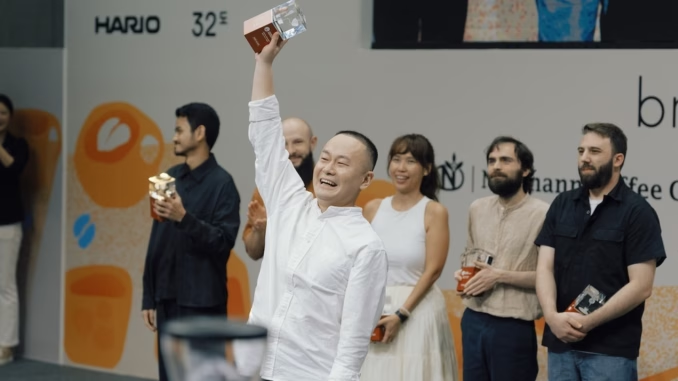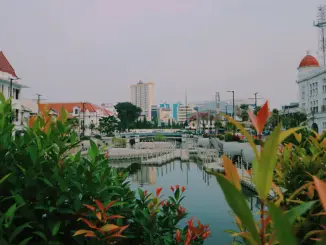
Earlier this year, the Chinese coffee competitor won the 2025 World Brewers Cup Championship. Today, he tells the story of his competition journey.
BY CHRIS RYAN
BARISTA MAGAZINE ONLINE
Photos courtesy of Captain George Coffee Roasters
George Jinyang Peng became interested in coffee as an enthusiast while in high school. A few years later, while still in college, he opened his first coffee shop.
Coffee has remained a passion for George ever since. He currently operates Captain George Coffee Roasters in Guiyang, China, and has been a consistent coffee competitor in the Brewers Cup event. He won China’s competition in 2023 and made it to the World Brewers Cup Championship, where he placed fifth.
This year, George won the national event again, and returned to the global stage. For the 2025 event in Jakarta, Indonesia, he took control, arriving in Jakarta early to devote himself to preparing for the event.
The work paid off: George placed five spots ahead of Indonesia’s Bayu Prawiro to win the 2025 World Brewers Cup, becoming the second competitor from China to achieve the honor following Du Jianing’s 2019 title.
We talked to George about his preparation, his competition theme, and much more.

Barista Magazine Online: Can you describe how you started working in coffee? Why did it interest you?
I actually started as a coffee enthusiast. I began brewing coffee at home when I was still in high school, and that hobby gradually turned into a passion. It eventually led me to become a barista. Later, while I was in college, I opened my first coffee shop. Running the shop exposed me to a wide variety of coffees, and I became increasingly fascinated by the language used to describe their flavors. One day, while brewing at home, I suddenly tasted floral and fruity notes in the cup, which was something I hadn’t experienced before. That moment completely drew me into the sensory world of coffee.
When you started in coffee competitions, why did you choose Brewers Cup?
As a roaster, I’ve always been particularly passionate about extraction. In the beginning, though, I only knew how to cup coffees, so whenever customers came to talk about coffee, I would default to cupping as the starting point. That made me realize I needed to truly understand brewing. Brewing is full of variables and nuances; at first, it felt vague and hard to grasp. But that complexity intrigued me. I started digging deeper into brewing theory, determined to turn uncertainty into clarity.

I read that temperature was a main theme in your routine this year. Why was that topic important to you, and how did you explore it in your performance?
I see temperature as a governing force in so many aspects of coffee, from the caramelization and Maillard reactions during roasting, to how people perceive sweetness, acidity, bitterness, and even saltiness at different beverage temperatures. I wanted to use temperature as a central theme to help people appreciate just how influential it is in shaping their coffee experience.
At the same time, I think temperature also represents connection. It’s part of the warmth we share between barista and customer. In my presentation, I explored temperature control throughout the entire journey, from green bean storage to roasting and brewing, including both environmental and beverage temperatures. By managing each stage precisely, I aimed to demonstrate to the audience how critical temperature is in crafting the final cup.
Can you describe how you prepared for the competition this year, going to Jakarta early and renting a space to practice? What did you do there, and how did it help you in the competition?
I arrived in Jakarta quite early before the competition. It was a city I had never really explored before, and during my time there, I kept my focus entirely on preparation. I barely left the apartment or the training space. I only went to the competition venue and briefly visited the city center after everything was over.
That kind of focused isolation was a first for me. It became a deeply immersive experience, allowing me to pour all my energy into refining the details. I worked on designing the roasting profile and extraction protocol specific to Jakarta’s conditions, like altitude and humidity. I believe this localized approach helped optimize my performance on stage. It wasn’t just about adapting, it was about honoring the environment I was in.

I read that you used a Gesha from Panama’s Mount Totumas in the competition. Why did you choose that coffee, and how much of a part do you think it played in you winning—especially in such a close competition where the second-place finisher was only nine points behind you?
My personal goal was to find a coffee that truly expressed its terroir. During cupping, the Mount Totumas Gesha stood out with its incredibly vivid purple floral and purple grape notes, something I rarely experience in naturally processed, additive-free coffees. I knew I wanted to share that experience with the judges.
That said, I don’t measure a coffee’s contribution purely by the score. For me, the competition was an opportunity to showcase what I believe an exceptional origin coffee can be in 2025. By the time we reached the top six, everyone had excellent coffees. My choice was more about expressing my own sensory aesthetic, rather than trying to win through the coffee alone.
And finally, how did you get the nickname Captain George?
I’ve always been a fan of Chinese martial arts novels and American superhero movies, so I think I naturally gravitate toward heroic stories and characters. My English name is George, and combining it with that heroic spirit, I gave myself the nickname “Captain George.” It’s a little bit of fun, but also a way to express the ideals I admire.
Subscribe and More!
As always, you can read Barista Magazine in paper by subscribing or ordering an issue.
Read the October + November 2025 Issue for free with our digital edition.
For free access to more than five years’ worth of issues, visit our digital edition archives here.





